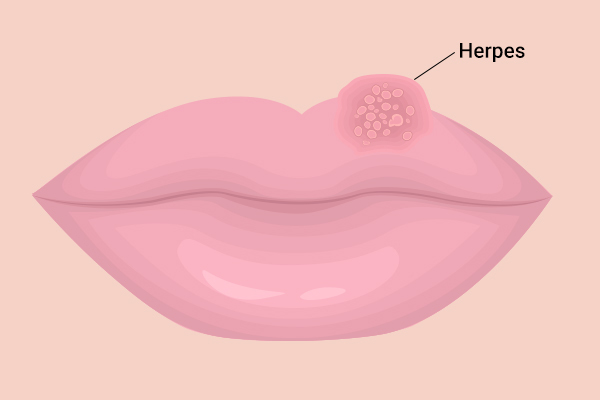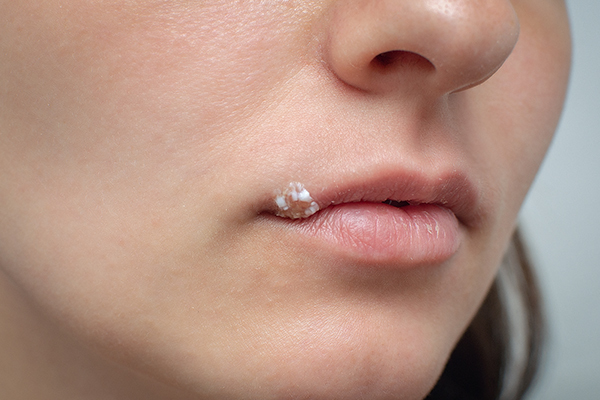In this article:
The herpes simplex virus (HSV) causes painful lesions and sores on the skin. (1) Two major types of herpes infections are caused by the two virus strains, HSV-1 and HSV-2. (2)

HSV-1 is more associated with oral herpes and eye infections, whereas HSV-2 commonly causes genital herpes. (3)(4)
Causes of Herpes
HSV spreads via direct contact with an infected person. It is usually not transmitted through a person’s belongings such as bedsheets and commonly spreads through skin-to-skin contact.
The virus stays in the body forever once you get it. After the first bout of lesions and other symptoms are treated, the virus travels to the nerve cells and stays dormant. However, factors such as compromised immunity, illnesses, UV exposure, or stress can reactivate it. (5)
Some people may get infected with HSV and show no symptoms. They are called “asymptomatic carriers” and may unknowingly spread the infection to other people. (6)
Symptoms of Herpes
Herpes symptoms may appear a couple of days or even weeks after the infection. The most common symptoms of herpes are: (7)

- Skin irritation, burning, or itching
- Blisters and sores around the mouth (8)
- Sores in and around the anus and genital area
- Fever and inflammation
- Painful urination associated with genital herpes
- Eye infections (9)
Note: Some people may get infected but have no symptoms at all. If you suspect you have been infected by herpes or have come in close contact with an affected individual, it is best to get yourself tested and consult a doctor.
Treatment of Herpes

There is no complete cure for herpes. The virus can stay in your body forever after the infection. However, once the initial outbreak of blisters is cured, you can hopefully prevent recurrence by avoiding stress and other aggravating factors. (10)
The blisters and sores caused by HSV usually clear on their own. Your doctor can shorten the healing time by prescribing antiviral medications and painkillers.
Commonly prescribed medicines for herpes are:
- Antiviral drugs such as acyclovir, famciclovir, and valacyclovir
- Painkillers such as acetaminophen and ibuprofen (7)
Diagnosing Herpes
Your doctor can diagnose a herpes infection simply by examining your sores and lesions. In some cases, they may take a sample from the lesions to confirm the diagnosis. They may also ask you to undergo a blood test or a Tzanck test. (11)
Risk Factor for Herpes
Some people are more at risk of getting infected by herpes. These include:
- Immunocompromised individuals (people with immune disorders or those infected with HIV)
- People suffering from diabetes (12)
When to See a Doctor

Consult a primary care doctor or dermatologist immediately if:
- You have cold sores near the eyes.
- You have a weakened immune system due to disease or medication.
- Your sores are not healing even after a couple of weeks.
- Your blisters are extremely painful. (13)
Final Word
Herpes is a very common viral infection. More than 40% of Americans are estimated to have genital or oral herpes. Most of these individuals are asymptomatic and do not develop sores.
If you suspect you have herpes, consult a dermatologist immediately and seek proper treatment to avoid the recurrence of blisters. (14)
- Was this article helpful?
- YES, THANKS!NOT REALLY


